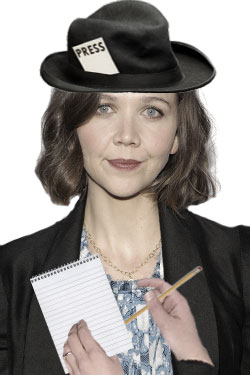
In the Golden Globe–winning Crazy Heart, Maggie Gyllenhaal plays Jean Craddock, a single mom trying to make it as a small-town music journalist. This makes complete sense, of course: Barron’s recently named “small-town music journalist” the 23,186th most desirable profession in the country, right after “mimeograph critic” and “frass wrangler.” But throughout the course of Crazy Heart, Craddock’s writing career takes a few incredulous turns. All of which prompts us to wonder: What’s the most realistic music-journo movie of all time?
THE DOORS (1991)
BYLINE: Patricia Kennealy (Kathleen Quinlan), a rock writer who takes a fancy to Doors front man and all-around ’tard-bard, Jim Morrison (Val Kilmer)
NUT GRAPH: During a wild night that finds the two drinking blood, taking drugs, and blathering about Dionysus, Kennealy seduces the singer by twirling around in the nude — though she keeps her glasses on while twirling, because you need that for balance, and besides, she’s a lady. She then pulls Morrison to bed with the words “Rock god, fuck me! Fuck me good!”
PLAUSIBILITY RATING: MEDIUM Though Kennealy is in fact a former Morrison paramour, she apparently renounced the movie after its release (wonder why?). So while we can assume the blood-chugging and good-fuck dialogue are somewhat exaggerated, this certainly wouldn’t be the first instance of a reporter and a musician having incredibly pretentious sex.
CB4 (1993)
BYLINE: A. White (Chris Elliott), the honky documentarian hired to follow Chris Rock’s faux-gangsta rap group.
NUT GRAPH: In a blatant attempt to glean some of his subjects’ urban cred, White asks kowtowing questions, lamely inserts outdated slang, and vilifies the group’s opponents. By the film’s end, he’s wearing a CB4 cap on-camera.
PLAUSIBILITY RATING: HIGH Though CB4 was intended as satire, White displays the sad (and creepy) sycophancy not uncommon to the trade. And, like all good-bad cultural chroniclers, he knows to blame all his mistakes on his editor.
ALMOST FAMOUS (2000)
BYLINE: Improbably innocent seventies adolescent William Miller (Patrick Fugit) gets his first assignment for Rolling Stone magazine.
NUT GRAPH: While on the road with the members of Stillwater — who look and sound like a slightly confused Kings of Leon — Miller awkwardly tries to balance his need for objectivity with his own worship of rock music. In the end, he lands a cover story, only to be booted out of the Stone office when a fact-checker deems his story a fanboy fabrication.
PLAUSIBILITY RATING: HIGH This is all taken from writer-director Cameron Crowe’s life, so we have no choice but to believe it’s true; after all, when has a boomer ever indulged in fact-warping self-canonization? But even if he did take some liberties (there’s no way he and his editors wouldn’t have fought harder for the story), Miller’s conflicted relationship with the band and awkward interviews are recognizable to anyone who’s ever wielded a cassette recorder.
THE IDOLMAKER (1980)
BYLINE: Ellen Fields (Maureen McCormick), an ambitious young correspondent for Teen Scene magazine.
NUT GRAPH: While pursuing a cover feature on a late-fifties heartthrob named Caesare (Peter Gallagher, who looks and sounds like a slightly confused Buster Poindexter), Fields craftily employs a divide-and-conquer interview strategy, isolating her subject from his controlling, press-weary manager. But after a series of hard-hitting questions — i.e., “What one thing attracts you to a woman?” — Fields and Caesare have a lengthy affair, and the singer’s irate manager gets her fired.
PLAUSIBILITY RATING: LOW Considering the loosey-goosey ethics of the payola-era music biz, it’s hard to believe there’d be so much huff over reporter-subject extramarital relations. And why would Caesare’s manager worry about his client getting such fawning coverage?
ANNIE HALL (1977)
BYLINE: Pam (Shelley Duvall), a Rolling Stone reporter
NUT GRAPH: While on a blind date with Alvy (Woody Allen), Pam pontificates at length about Bob Dylan, refers to Mick Jagger as “Mick,” and describes sex as a “Kafkaesque experience.”
PLAUSIBILITY RATING: HIGHEST Meandering Dylan spiels? The showy first-name drops? “Kafkaesque”? This is possibly the most transplendidly spot-on music journalist of all time!
CRAZY HEART (2009)
BYLINE: Jean Craddock (Gyllenhaal), a reporter for a Santa Fe newspaper, sets out to profile country legend Bad Blake (Jeff Bridges).
NUT GRAPH: (Spoiler alert!) In their first interview — conducted in a seedy motel room — Craddock lobs questions that she easily could have solved with a two-second Bing search, and then asks him about his influences. The two begin a lengthy long-distance affair, and Craddock eventually becomes a star reporter.
PLAUSIBILITY RATING: LOW We never find out if Craddock’s story actually ran, which just makes her ascent more confusing: Did she reveal the affair to her editors? And even if she did, why would anyone ever hire her again? In the end, it’s hard to believe someone so ethically malleable would make it in the world of print journalism. They should have made her a music blogger.




